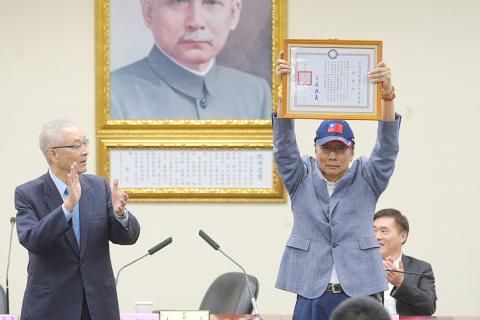Hon Hai Precision Industry Co (鴻海集團) chairman Terry Gou (郭台銘) yesterday confirmed his intention to run in the Chinese Nationalist Party (KMT) presidential primary, saying that he was told to do so in a dream by the goddess Matsu.
“Matsu told me to come out,” Gou said while visiting Cihui Temple (慈惠宮) in New Taipei City’s Banciao District (板橋).
He said he was awaiting instructions from Holy Emperor Guan on how to help the nation’s “poor masses and its youth,” which would be sent to him via public opinion polls.

Photo: Chang Chia-ming, Taipei Times
In the afternoon, Gou attended a ceremony at which KMT Chairman Wu Den-yih (吳敦義) gave him a Central Standing Committee “honorary certificate,” while referring to him as a “comrade” and “fellow party member.”
The certificate was understood to be a response to questions about Gou’s eligibility to run in the party’s primary as he had not been paying dues.
Gou said that the KMT must establish a primary that is “open and in touch with the people” to set a good precedent.
He would not accept the nomination without first going through the primary process, he added.
“A fair, open and transparent primary that is in touch with public sentiment is the first step toward establishing public trust in the KMT and developing the spirit of the party,” he said.
He has always valued peace, stability, economic prosperity and a better future above all else, whether as a businessman or while exploring other opportunities, which he is “very likely to do,” Gou said.
He said he hopes to work with the KMT to help it find its “party spirit and the honor of being a party member,” as well as to help it attract younger members.
Before yesterday’s ceremony, Gou bowed before photographs of Republic of China founder Sun Yat-sen (孫逸仙), and former presidents Chiang Kai-shek (蔣介石) and Chiang Ching-kuo (蔣經國).
Gou criticized former president Chen Shui-bian (陳水扁) for dismantling Chiang Ching-kuo’s office, which had remained in place until Chen took office.
Gou also said that he fondly remembers a couplet written by Chiang Ching-kuo that reads: “When calculating benefit, calculate for the benefit of the masses. When seeking fame, you should seek to be remembered through all the ages.”
Additional reporting by Chou Hsiang-yun and Lai Hsiao-tung

CHAOS: Iranians took to the streets playing celebratory music after reports of Khamenei’s death on Saturday, while mourners also gathered in Tehran yesterday Iranian Supreme Leader Ayatollah Ali Khamenei was killed in a major attack on Iran launched by Israel and the US, throwing the future of the Islamic republic into doubt and raising the risk of regional instability. Iranian state television and the state-run IRNA news agency announced the 86-year-old’s death early yesterday. US President Donald Trump said it gave Iranians their “greatest chance” to “take back” their country. The announcements came after a joint US and Israeli aerial bombardment that targeted Iranian military and governmental sites. Trump said the “heavy and pinpoint bombing” would continue through the week or as long

TRUST: The KMT said it respected the US’ timing and considerations, and hoped it would continue to honor its commitments to helping Taiwan bolster its defenses and deterrence US President Donald Trump is delaying a multibillion-dollar arms sale to Taiwan to ensure his visit to Beijing is successful, a New York Times report said. The weapons sales package has stalled in the US Department of State, the report said, citing US officials it did not identify. The White House has told agencies not to push forward ahead of Trump’s meeting with Chinese President Xi Jinping (習近平), it said. The two last month held a phone call to discuss trade and geopolitical flashpoints ahead of the summit. Xi raised the Taiwan issue and urged the US to handle arms sales to

State-run CPC Corp, Taiwan (CPC, 台灣中油) yesterday said that it had confirmed on Saturday night with its liquefied natural gas (LNG) and crude oil suppliers that shipments are proceeding as scheduled and that domestic supplies remain unaffected. The CPC yesterday announced the gasoline and diesel prices will rise by NT$0.2 and NT$0.4 per liter, respectively, starting Monday, citing Middle East tensions and blizzards in the eastern United States. CPC also iterated it has been reducing the proportion of crude oil imports from the Middle East and diversifying its supply sources in the past few years in response to geopolitical risks, expanding

OTHER OPTIONS: Given possible US intervention and Taiwanese counterattacks, China might opt to blockade Taiwan or take its outlying islands instead of an all-out invasion A US think tank has urged Taiwan to adopt a “hellscape” strategy that would flood the Taiwan Strait with drones and other uncrewed systems to deter invasion by China. In its report, Hellscape for Taiwan, published on Thursday, the Center for a New American Security said Taipei’s asymmetric defense approach — often described as a “porcupine strategy” — needs to evolve to keep pace with the growing capabilities of the Chinese People’s Liberation Army. The “hellscape” strategy involves saturating the air and waters around Taiwan with thousands of drones and other platforms capable of striking invading forces from multiple domains at once. Long-range